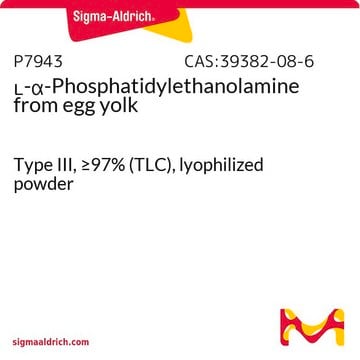P2772
L-α-phosphatidylcholine
egg yolk, Type XI-E, 100 mg/mL in chloroform, ≥99%, solution
Synonyme(s) :
1,2-diacyl-sn-glycéro-3-phosphocholine, 3-sn-phosphatidylcholine, L-α-lécithine, Asolectine, PC
About This Item
Produits recommandés
Source biologique
egg yolk
Niveau de qualité
Type
Type XI-E
Pureté
≥99%
Forme
solution
Concentration
100 mg/mL in chloroform
Groupe fonctionnel
phospholipid
Type de lipide
phosphoglycerides
Température de stockage
−20°C
InChI
1S/C42H80NO8P/c1-6-8-10-12-14-16-18-20-21-23-25-27-29-31-33-35-42(45)51-40(39-50-52(46,47)49-37-36-43(3,4)5)38-48-41(44)34-32-30-28-26-24-22-19-17-15-13-11-9-7-2/h14,16,20-21,40H,6-13,15,17-19,22-39H2,1-5H3/b16-14-,21-20-/t40-/m1/s1
Clé InChI
JLPULHDHAOZNQI-ZTIMHPMXSA-N
Vous recherchez des produits similaires ? Visite Guide de comparaison des produits
Catégories apparentées
Application
<li><strong>Fabrication of Microalgae Oil Vesicles for Drug Delivery Applications:</strong> This study highlights the use of L-a-Phosphatidylcholine in creating microalgae oil vesicles, showing promise for encapsulating and delivering hydrophobic drugs effectively (Lin YC et al., 2024).</li>
<li><strong>Terpenes-Modified Lipid Nanosystems for Temozolomide, Improving Cytotoxicity against Glioblastoma Human Cancer Cells In Vitro:</strong> L-a-Phosphatidylcholine is employed to formulate terpene-modified lipid nanosystems, enhancing the solubility and bioactivity of temozolomide for glioblastoma treatment (Pashirova TN et al., 2023).</li>
<li><strong>Mitochondria-Targeted Lipid Nanoparticles Loaded with Rotenone as a New Approach for the Treatment of Oncological Diseases:</strong> Utilizing L-a-Phosphatidylcholine, this research developed mitochondria-targeted lipid nanoparticles, potentially offering a novel strategy for cancer therapy (Vasileva L et al., 2023).</li>
</ul>
Actions biochimiques/physiologiques
Notes préparatoires
Mention d'avertissement
Danger
Mentions de danger
Classification des risques
Acute Tox. 3 Inhalation - Acute Tox. 4 Oral - Carc. 2 - Eye Irrit. 2 - Repr. 2 - Skin Irrit. 2 - STOT RE 1 Oral - STOT SE 3
Organes cibles
Central nervous system, Liver,Kidney
Code de la classe de stockage
6.1D - Non-combustible acute toxic Cat.3 / toxic hazardous materials or hazardous materials causing chronic effects
Classe de danger pour l'eau (WGK)
WGK 3
Point d'éclair (°F)
Not applicable
Point d'éclair (°C)
Not applicable
Équipement de protection individuelle
Eyeshields, Faceshields, Gloves, type ABEK (EN14387) respirator filter
Certificats d'analyse (COA)
Recherchez un Certificats d'analyse (COA) en saisissant le numéro de lot du produit. Les numéros de lot figurent sur l'étiquette du produit après les mots "Lot" ou "Batch".
Déjà en possession de ce produit ?
Retrouvez la documentation relative aux produits que vous avez récemment achetés dans la Bibliothèque de documents.
Les clients ont également consulté
Notre équipe de scientifiques dispose d'une expérience dans tous les secteurs de la recherche, notamment en sciences de la vie, science des matériaux, synthèse chimique, chromatographie, analyse et dans de nombreux autres domaines..
Contacter notre Service technique







